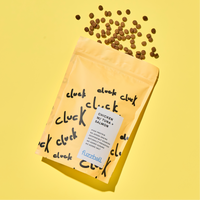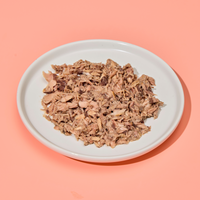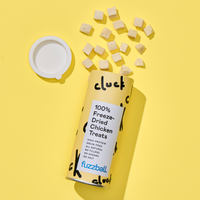How to Tell If Your Cat is Getting Enough Protein

Protein is a cornerstone of feline nutrition, playing a critical role in supporting your cat’s energy, growth, and overall health. As obligate carnivores, cats are biologically designed to thrive on protein-rich diets, relying on it not just for building and repairing tissues but also as their primary energy source. The right balance of protein helps maintain a healthy coat, strong muscles, and a resilient immune system, while deficiencies can lead to visible health concerns. Understanding your cat’s protein needs is key to ensuring they remain healthy, active, and content at every stage of life.
The Importance Of Protein For Cats
As a building block for tissues, organs, and muscles, protein is critical to a cat's health and plays a key role in many body processes. As obligate carnivores, cats need more protein than many other animals and depend on it for energy, particularly because they are unable to readily modify their metabolism to consume less protein like some other species. A dull coat, greater susceptibility to infections, and muscle atrophy can result from a protein deficiency.
What Are the Common Sources Of Protein In Cat Food?
Animal protein and plant protein are the two primary protein sources found in cat food. Cats cannot receive enough nourishment from plant sources alone, even though pet parents may find vegetarian diets and other protein sources appealing. Plant products do not contain some nutrients; only animal tissues do.

Does My Cat Need High-Protein Cat Food?
Cats are obligate carnivores, meaning they rely on protein as their main source of energy and essential nutrients. High-protein cat food can support muscle health, energy levels, and overall well-being, especially for active cats, kittens, and seniors. However, the ideal protein level depends on your cat’s age, activity, and health, so it’s best to choose a high-quality food with clearly named meat or fish sources and consult your vet for tailored advice.
What Factors Affect How Much Protein My Cat Needs?
There are many different factors that can affect how much protein your cat needs. However, most cats need a cat food with protein levels of 75%, just like Fuzzball’s food. Some of the factors that will affect how much protein your cat needs include:
|
Factor |
How It Affects Protein Needs |
|
Age |
Kittens need higher protein for growth; seniors may need more to maintain muscle mass, but may require moderation if health issues are present. |
|
Activity Level |
Active or outdoor cats burn more energy and require higher protein to support muscle repair and energy needs. |
|
Health Status |
Conditions like kidney disease may require lower or moderate protein, while recovery from illness or surgery often increases protein needs. |
|
Life Stage |
Pregnant or nursing cats require significantly more protein for fetal growth and milk production. |
|
Body Condition |
Underweight cats may need more protein to rebuild muscle, while overweight cats benefit from high-quality protein to preserve lean mass during weight loss. |
|
Diet Type |
Wet, dry, or raw diets can vary in protein concentration, which influences how much a cat needs to meet daily requirements. |
How Can I Tell If My Cat Is Getting Enough Protein?
By looking at a cat's general health and behaviour, one can determine how much protein they consume. A healthy coat, a good amount of muscle mass, and steady energy levels are indicators. A dull coat, tiredness, or weight loss could be signs of inadequate protein. To keep an eye on your cat's nutritional condition, routine veterinary examinations are also essential.
How Can I Increase the Amount Of Protein My Cat Gets?
Make sure your cat is eating high-quality, animal-based protein sources to help them acquire more protein. Take into account a combination of plant-based and animal-based proteins and make sure the protein is digestible. To find the ideal protein sources and amounts for your cat's specific requirements, speak with your veterinarian.
What Are the Benefits Of Protein For Cats?
As mentioned, protein is the most important part of a cat’s diet, and they can provide many benefits for them. These benefits include:
Healthy Skin and Coat
Protein supplies essential amino acids that are vital for producing keratin, the structural protein in a cat’s fur and skin. Adequate protein intake helps maintain a glossy, strong coat and supports skin health by aiding cell repair and regeneration.
Encourage Muscle Development
High-quality protein fuels muscle growth and maintenance, making it especially important for kittens, active cats, and those recovering from injury. It provides the building blocks needed for lean muscle mass, which supports mobility and strength.
Provides Energy
Cats rely on protein as a primary energy source rather than carbohydrates. The amino acids from protein are converted into glucose through gluconeogenesis, ensuring a steady supply of energy to support daily activities and overall vitality.
Provides Support to Senior Cats
As cats age, they naturally lose muscle mass. A protein-rich diet helps slow this process, maintaining mobility and strength while supporting overall health. It also aids in preserving a healthy body condition in older cats.
Aids Immune Function
Protein plays a key role in producing antibodies, enzymes, and other immune system components. This supports the body’s ability to fight off infections, recover from illness, and maintain overall resilience against disease.
What Is the Best Source Of Protein For Cats?
Since cats are obligate carnivores, the greatest protein sources for them are animal-based. Fish and chicken are also good choices. Additionally, eggs are a fantastic source of minerals and protein.
What Happens If a Cat Gets Too Much Protein?
Because they are carnivores, cats require a high-protein diet, yet too much protein can be harmful and cause health problems. Particularly in elderly cats or those with underlying kidney diseases, excessive protein intake can put stress on the kidneys. If the extra protein is deposited as fat, it may also lead to obesity.
Can Cats Be Allergic To Protein?
Protein allergies in cats are actually rather frequent. Allergies to proteins in food, especially animal proteins, are common in cats. These allergies may show up as gastrointestinal disorders like diarrhoea and vomiting, or skin conditions like itching and lesions.
Making sure your cat gets enough high-quality protein is one of the most important steps you can take to support their long-term health. From maintaining muscle mass to boosting immunity, the right protein intake influences nearly every aspect of their well-being. By choosing a diet rich in digestible, animal-based proteins and working with your vet to meet your cat’s specific needs, you can help them enjoy a healthier, more energetic life. With the right nutrition, your cat can thrive—inside and out—for years to come.




